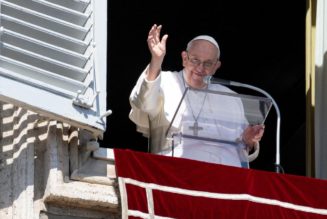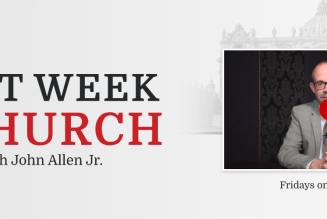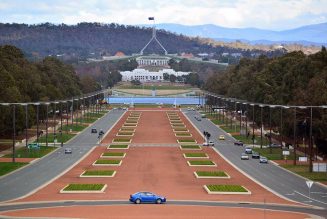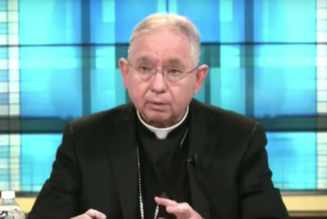
On Saturday, the pope met with two senior Canadian Vatican officials, Cardinal Michael Czerny and Cardinal Marc Ouellet, and also appointed a new Vatican ambassador to Canada.
Pope Francis gave his live-streamed Angelus address at a window overlooking St. Peter’s Square, where a sizeable crowd of pilgrims stood wearing face coverings to prevent the spread of COVID-19.
He dedicated the address to the feast of Corpus Christi, celebrated on Thursday at the Vatican, but observed on Sunday in Italy and other countries.
He noted that the day’s Gospel reading describes how Jesus took bread, blessed it, and shared it with his disciples at the Last Supper.
“And thus, with simplicity, Jesus gives us the greatest sacrament. His is a humble gesture of giving, of sharing,” he said.
“At the culmination of his life, he does not distribute an abundance of bread to feed the crowds, but he breaks himself at the Passover supper with the disciples. In this way, Jesus shows us that the aim of life lies in self-giving, that the greatest thing is to serve.”
“And today once more we find the greatness of God in a piece of bread, in a fragility that overflows with love, overflows with sharing.”
The pope underlined the word “fragility” in relation to the Eucharist.
“Jesus becomes fragile like the bread that is broken and crumbled. But therein lies his strength, in his fragility. In the Eucharist, fragility is strength: the strength of the love that becomes small so as to be welcomed and not feared; the strength of the love that is broken and shared so as to nourish and give life; the strength of the love that is split apart so as to join us in unity,” he said.
The pope noted that Jesus instituted the Eucharist on the night that he was betrayed.
“And what does Jesus do? He reacts to the evil with a greater good. He responds to Judas’ ‘no’ with the ‘yes’ of mercy. He does not punish the sinner, but rather gives His life for him,” he said.
(Story continues below)
“When we receive the Eucharist, Jesus does the same with us: he knows us; he knows that we are sinners and we make many mistakes, but he does not give up joining his life to ours. He knows that we need it, because the Eucharist is not the reward of saints, no, [but] the Bread of sinners. This is why he exhorts us: ‘Do not be afraid! Take and eat.’”
Each time we receive the Eucharist, he added, Jesus reminds us that we are more precious than we realize.
“He tells us he is pleased if we share our fragilities with Him. He repeats to us that his mercy is not afraid of our miseries,” he said.
“Jesus’ mercy is not afraid of our miseries. Above all, he heals us with love from those frailties that we cannot heal on our own.”
The pope said that the Eucharist “heals rigidity and transforms it into docility” because it joins those who receive it to Jesus.
“This is the logic of the Eucharist: we receive Jesus who loves us and heals our fragilities in order to love others and help them in their fragilities,” he explained.
Join Our Telegram Group : Salvation & Prosperity





